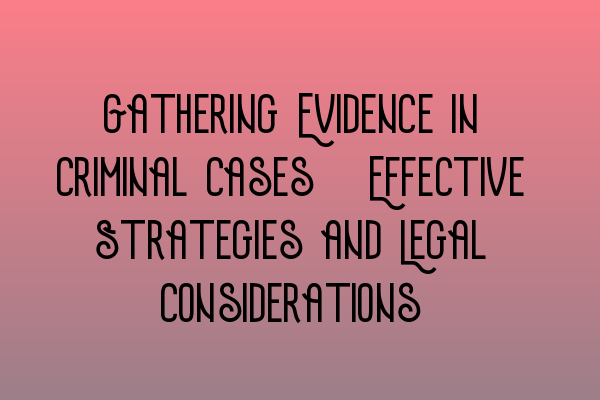Gathering Evidence in Criminal Cases: Effective Strategies and Legal Considerations
When it comes to criminal cases, gathering evidence is a crucial aspect of building a strong defense or a convincing prosecution. The process of gathering evidence involves various strategies and legal considerations that can greatly impact the outcome of a case. In this article, we will discuss some effective strategies and important legal aspects to consider when collecting evidence in criminal cases.
The Importance of Gathering Evidence
Effective evidence gathering plays a vital role in criminal cases as it helps establish the guilt or innocence of the accused. It provides a factual basis upon which legal arguments can be built and helps ensure a fair and just outcome. Without proper evidence, it becomes challenging for the court to make an informed decision. Whether you are a defense solicitor or a prosecutor, understanding the significance of gathering evidence is essential for success in criminal litigation.
Effective Strategies for Gathering Evidence
1. Conduct Thorough Investigations: A comprehensive investigation is the foundation of a strong case. Collecting witness statements, examining crime scenes, and reviewing relevant documents are vital steps in building a compelling case. It is important to leave no stone unturned during the investigation process to uncover any potential leads or information that can support your case.
2. Interview Witnesses: Witness statements are valuable pieces of evidence. Interviewing witnesses allows you to gather firsthand accounts of the events in question. Ensure you conduct interviews in a professional and non-coercive manner to maintain the credibility of the evidence. If needed, consider hiring expert witnesses who can provide specialized testimony on specific aspects of the case.
3. Obtain Physical Evidence: Physical evidence can provide undeniable proof in criminal cases. Collect and preserve any physical evidence that may be relevant to the case, such as fingerprints, DNA samples, or surveillance footage. Ensure proper chain of custody is maintained to avoid tampering or contamination of the evidence.
4. Utilize Digital Forensics: In today’s digital age, electronic evidence can play a critical role. Use digital forensics techniques to examine computers, smartphones, social media accounts, or any other electronic devices that may contain relevant information. Digital evidence can provide valuable insights into a suspect’s activities, communications, or intentions.
5. Collaborate with Experts: Consulting experts in specialized fields can provide additional credibility and depth to your case. Forensic scientists, psychologists, or medical professionals can assist in interpreting complex evidence or providing expert opinions. Their expertise can strengthen your arguments and bolster the impact of your evidence.
Legal Considerations
1. Admissibility of Evidence: It is crucial to ensure that all evidence gathered is admissible in court. Familiarize yourself with the rules of evidence and relevant case law to understand what can be presented in court and what may be challenged. Improperly obtained evidence or evidence that violates the accused’s rights may be deemed inadmissible, potentially weakening your case.
2. Chain of Custody: To maintain the integrity of the evidence, proper chain of custody must be established and documented. This ensures that the evidence has been properly handled, documented, and protected from tampering or contamination. Any inconsistencies or gaps in the chain of custody can be exploited by the opposing party to cast doubt on the evidence’s reliability.
3. Preservation of Evidence: Timely preservation of evidence is crucial to prevent its deterioration or loss. Take necessary steps to ensure that all relevant evidence is properly secured and protected. Failure to preserve evidence can lead to accusations of spoliation, which may result in negative consequences for your case.
Conclusion
Gathering evidence in criminal cases requires a strategic and thorough approach. By following effective strategies and considering the important legal aspects, you can maximize the impact of the evidence you collect. Remember to conduct comprehensive investigations, interview witnesses, obtain and preserve physical and digital evidence, and collaborate with experts when necessary. Stay updated with the rules of evidence and ensure the admissibility of your evidence by establishing proper chain of custody. With these considerations in mind, you can build a strong case and increase your chances of achieving a successful outcome.
For more information on SQE exam preparation and practice, check out our helpful articles:
- SQE 1 Practice Exam Questions
- SQE 1 Practice Mocks FLK1 FLK2
- SQE 2 Preparation Courses
- SQE 1 Preparation Courses
- SRA SQE Exam Dates
